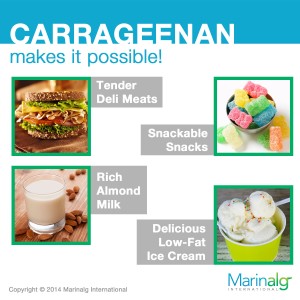A naturally occurring stabilizing agent derived from red seaweed, carrageenan helps bind proteins together so foods stay mixed, retain moisture and keep their familiar textures, especially in reduced fat, sodium and sugar products.
Carrageenan is widely used in a variety of foods and beverages—from the bakery section to the deli counter to the dairy aisle. It is an important part of the diverse food supply because it provides a vegetarian alternative to animal-based ingredients like gelatin, helps improve shelf life and makes food more enjoyable, all while reducing food waste .
.
Sustainably Grown
The red seaweed used to make carrageenan is commonly grown in a sustainable manner on small farms that are most often owned and operated by families living in in tropical climates. As the seaweed farmed for carrageenan is not genetically modified and does not need pesticides or herbicides, it is popular in organic foods and can be used in vegan, kosher and halal-certified foods.
Vegetarian, Vegan, Kosher & Halal-Friendly
Carrageenan is very versatile even though it is only added to food in very small quantities. Carrageenan can be used as a humectant (to keep foods moist); a stabilizer (to maintain the consistency of foods and drinks); a thickener (such as in sauces or low-fat foods); or a gelling agent (in, for example, vegetarian versions of desserts like flan or Jell-O).
 Keeping Deli Meats Tender, Longer
Keeping Deli Meats Tender, Longer
In deli meats, carrageenan helps retain moisture and texture, keeping sliced ham, turkey and other popular lunch options from drying out and crumbling. Carrageenan also helps reduce fat and salt content in these meats, making your sandwich or hotdog a morebalanced part of your diet.  Fruit snacks, pie fillings and other foods remain stable and useful longer with the help of carrageenan, which can help reduce food waste, a global problem as we try to feed 7 billion people.
Used To Help Reduce Fat ContentÂ
In reduced-fat dairy foods like ice cream, yogurt and cheese, carrageenan emulsifies and thickens, keeping these foods low-fat and low-calorie without sacrificing the texture, appearance or taste that consumers recognize from the full-fat versions. In jams, jellies and chocolate puddings, carrageenan helps to reduce sugar while ensuring these products are still spreadable on toast or are as creamy as you expect. In non-dairy beverages like almond or soy milk, carrageenan helps stabilize the product to ensure quality and consistency without imparting added fat, animal byproducts or genetically modified material.
Keeping Essential Nutrients Intact
Carrageenan also stabilizes ready-to-feed infant formulas, keeping essential nutrients intact and ensuring the consistent nutritional delivery parents want for their babies. These formulas can be particularly important in places with poor water quality and waterborne diseases because they expand access to a safe source of nutrition for infants without immunity to waterborne pathogens.
Helps Stabilize Foods & Limit Waste
Carrageenan also helps limit wasted food during production. Food producers use carrageenan to stabilize foods at room temperature, reducing transportation and storage costs—savings which can be passed through to supermarket shoppers in the form of lower food prices.
Carrageenan is truly a versatile and useful food ingredient that provides a number of functional benefits to the foods and beverages we consume.  Through carrageenan’s versatility and suitability for a range of food types, it is a key ingredient making food more enjoyable, convenient and affordable.
ADDITIONAL INFORMATION ON CARRAGEENAN